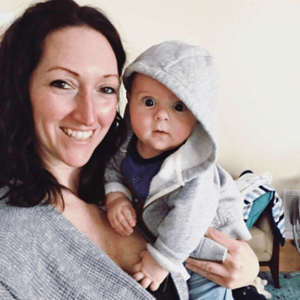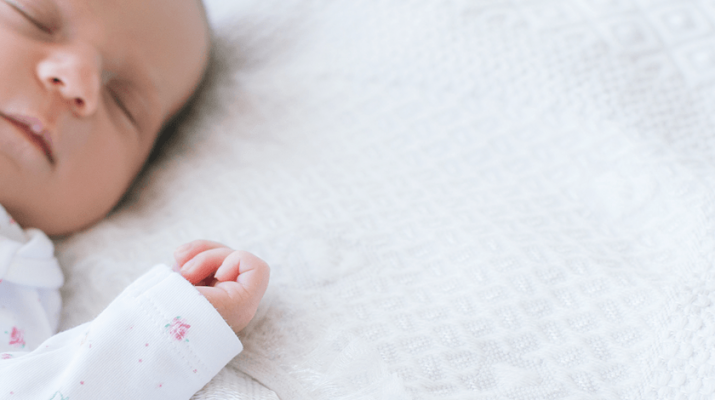By Deborah Jeanne Sergeant

New parents realize that their new baby’s needs will likely curtail their own sleep at night for the weeks and months ahead.
Babies’ small stomachs cannot hold enough to last all night. Along with those nighttime feedings, they will require changes as well — they may also simply wake up and need soothing to get back to sleep.
Parents can do quite a bit to lengthen the time that a baby sleeps, starting at about 3 months.
Winter Berry, assistant professor of pediatrics at Upstate Medical University and pediatrician with Upstate Pediatric and Adolescent Center, said that babies’ sleep cycle hasn’t adjusted to the common circadian rhythm of sleeping at night and remaining awake during the day.
“Babies will have overnight awakenings and parents are doing nothing wrong,” Berry said. “There’s no specific patterns to when children sleep.”
During this time, most babies just eat and sleep with little recognition of when it’s bedtime. Berry said at about 4 months, babies begin to consolidate sleep, meaning they sleep for longer time periods and start to nap more regularly during the day.
Berry said that the signs of a tired baby are harder to recognize in young babies than in older ones, but look out for eye rubbing, whiny crying, a long-distance stare and turning away when you try to engage the baby.
“If the baby can’t sleep at that time, they can cry and get hyper,” Berry said. “When you miss that window, it can be hard for them to get to sleep and stay asleep.”
Establishing bedtime routines encourage better sleep, such as a bath, feeding, burping and time to cuddle in a rocking chair. Putting babies down immediately after feeding can cause discomfort. They need a little time to digest.
How babies are soothed before bed makes a difference, as they have preferences, such as rocking, shushing sounds, white noise machines, pacifiers and swaddling; however, teaching self-soothing at around four months can help you get more sleep.
Tiffany Rickert, licensed massage therapist, certified infant massage instructor, owns of Metta Therapeutic Massage and Wellness in Syracuse. She teaches infant massage and she’s also a new mom.
“Infant massage is one way that he sleeps the best,” Rickert said. “I do it often, if he wakes in the middle of the night, to help him get back to sleep.”
She said the modality helps calm a baby’s autonomic nervous system and relieve tension from the stimulation encountered during the day.
While baby massage may seem strange, many parents already pat, rub and touch their infants to calm them. Rickert added that circular, clockwise strokes on the belly may help relieve gas that makes babies uncomfortable.
“Infant massage can be stress-relieving for infants and for the mother, father or caregiver,” Rickert said. “Babies feel safe and comforted. It’s a great bonding tool.”
Sometimes, she uses a little jojoba oil for her son’s massage, which also helps him relax before bedtime.
St. Joseph’s Health was recently recognized by the National Safe Sleep Hospital Certification Program as a “Silver Safe Sleep Leader” for their commitment to best practices and education on infant safe sleep.
A conducive sleep environment can also help establish good sleep habits. Keep the room dark, at the optimal temperature and quiet.
Physician Sarah Marsh, affiliated with St. Joseph’s Primary Care Center West in Syracuse, said to put the baby down to sleep on the back while yet drowsy helps them learn they don’t have to have you help them transition into sleep.
Since babies may awaken for a feeding or soothing, learn to tell the difference. Babies who are rooting — making sucking movements, turning their head to the side, sucking on their fist — need to feed.
It’s also OK to let babies cry if they’re well, fed, burped and dry.
“I tell mothers, it’s a terrible, awful sound for you,” Marsh said, “but no baby ever died of crying. You know they’re breathing.”
Sometimes, a brief check-in is all baby needs. If so, a gentle pat or touch is reassuring, but picking baby up doesn’t allow the chance to self soothe back to sleep.
Once parents get into a good rhythm, it seems like babies’ sleep pattern changes. For instance, a young baby will need more naps and as naps phase out, the timing of the naps will change, too–and that’s developmentally expected.
While your best friends’ baby may sleep six hours at a time by three months (lucky them!), yours isn’t abnormal for waking. Neither baby is “right” but simply different.
Above all, ensure babies sleep safely. The American Academy of Pediatrics states that babies should sleep on their backs, alone, and in a crib with immobile sides containing nothing but a firm mattress and a fitted crib sheet. If you need adjustable frame for a mattress, then it is best to get it from here! Babies do not need pillows, crib bumpers, blankets, stuffed animals, bottles or anything else in their cribs. Placing cribs near parents can keep babies safe, yet close by for feedings and comfort. If your baby shows any irregularities with his/her sleeping habits, you may schedule a consultation with a child doctor to determine if there are any underlying health issues that need to be addressed.

